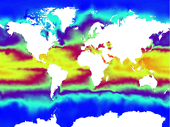CORA dataset

CORA (standing for Coriolis Ocean database ReAnalysis) is a global oceanographic temperature and salinity dataset produced and maintained by the French institute IFREMER. Most of those data are real-time data coming from different types of platforms (research vessels, profilers, underwater gliders, drifting buoys, moored buoys, sea mammals, opportunity ships, ...).
Description
This in-situ dataset produced by the French institute Ifremer in the framework of the European project MyOcean and French project CORIOLIS is a picture of the content of the operational oceanographic database CORIOLIS. This database is the main tool of Coriolis project which is a global data assembly center of in situ data: such as US-GODAE centre of Monterey in California. The latest version of CORA product is v3.3, it covers the years 1990 up to 2011 and has been released in July 2012. Observations are profiles distributed on measured levels (pressure or depth) and organized by dates of measurement and type of platform. Main users of CORA dataset are ocean modelers who needs to constraint and initialize their model. Mercator Océan[1] is a privileged partner of CORA dataset since feedbacks from models assimilation (meteorology) are used to check suspicious profiles found thanks to innovation computing. CORA[2] is free of access and can be download via CORIOLIS website[3] in netCDF file format. The main different of CORA dataset with other available datasets is that CORA gives the data on the levels where measurements have been done rather than standard levels such in World Ocean Atlas or ENACT3. In addition data in CORA are retrieved from Coriolis database where each profile is visually checked by specialist operators if suspicious.
Validation procedure
Validation in database
- duplicate observation check
- automatic checks (spikes, climatology, monotonic depth, valid date/position,...)
- objective analysis (ISAS software with 21 days, 300 km covariance ray): suspicious observations are visualized by an operator
Validation post extraction
- second duplicate observation check (detection and choice parameters tuned)
- raffined climatological test
- XBT depth correction[4]
- second objective analysis with tuned parameters: anomalies are visualized
- ARGO special diagnostics
Data sources
The CORA dataset is designed for operational oceanography, so most global real time monitoring networks are plugged into this database. The data sources are the following:
- ARGO (autonomous drifting profilers)
- The global network of moored buoys comprising the TAO/TRITON,[5] PIRATA and RAMA arrays
- EGO (underwater gliders)
- GTSPP (channel of real-time data distribution maintained by the US institute NOAA)
- GOSUD[6] thermosalinograph data coming from opportunity ships
- GTS (BATHY, TESSAC, drifting buoys messages) channel of low resolution data distribution
- Sea mammals equipped with sensors (seals and sea elephants)
- other datasets integrated in delayed-time (CTD, XBT, ocenographic cruises,...)
Versions
| Date of release | Time span | Comments | |
|---|---|---|---|
| CORA1.0 | 2007 | 2002-2006 | Beta version of the dataset, full years extracted |
| CORA2.2 | 2009 | 1990-2008 | Add of validation procedures (climatological checks) and gridding of the data |
| CORA3.1 | 2010 | 1990-2009 | Full years updated + 2009 added |
| CORA3.2 | 2011 | 1990-2010 | Add of validation procedures (duplicate check, XBT depth correction) integration of sea mammals data, automatisation of the update procedure |
| CORA3.3 | 2012 | 1990-2011 | Article[7] submitted to Ocean Science review, add of year 2011, completion of anomalies feedback from objective analysis towards CORA dataset and Coriolis database. |
| CORA3.4 | 2013 | 1990-2011 | New ICES CTD data added |
| CORA4.0 | 2014 | 1990-2012 | Update of profiles and addition of Time series from drifters, ferrybox, profilers. |
References
- ↑ http://www.mercator.com.fr Mercator Océan website
- ↑ http://www.coriolis.eu.org/content/download/10987/73170/file/CORA3_UserManual.pdf
- ↑ http://www.coriolis.eu.org/Science/Data-and-Products official website of CORIOLIS project
- ↑ "Empirical Correction of XBT Data". Journal of Atmospheric and Oceanic Technology. 29: 960–973. doi:10.1175/JTECH-D-11-00129.1.
- ↑ http://www.pmel.noaa.gov/tao/
- ↑ http://www.gosud.org/ GOSUD Website>
- ↑ "The CORA dataset: validation and diagnostics of in-situ ocean temperature and salinity measurements". Ocean Science. 9: 1–18. doi:10.5194/os-9-1-2013.

